Feeling the pressure of bounce-back culture since having a baby?
Struggling to adjust to your new or different body since giving birth?
Discovering new or different challenges with eating or food in the postpartum period?
Whether you’re 2 weeks or several years out from giving birth, or currently pregnant and nervously anticipating food or body struggles after birth, you deserve knowledgeable and compassionate support catered to these unique overlaps.
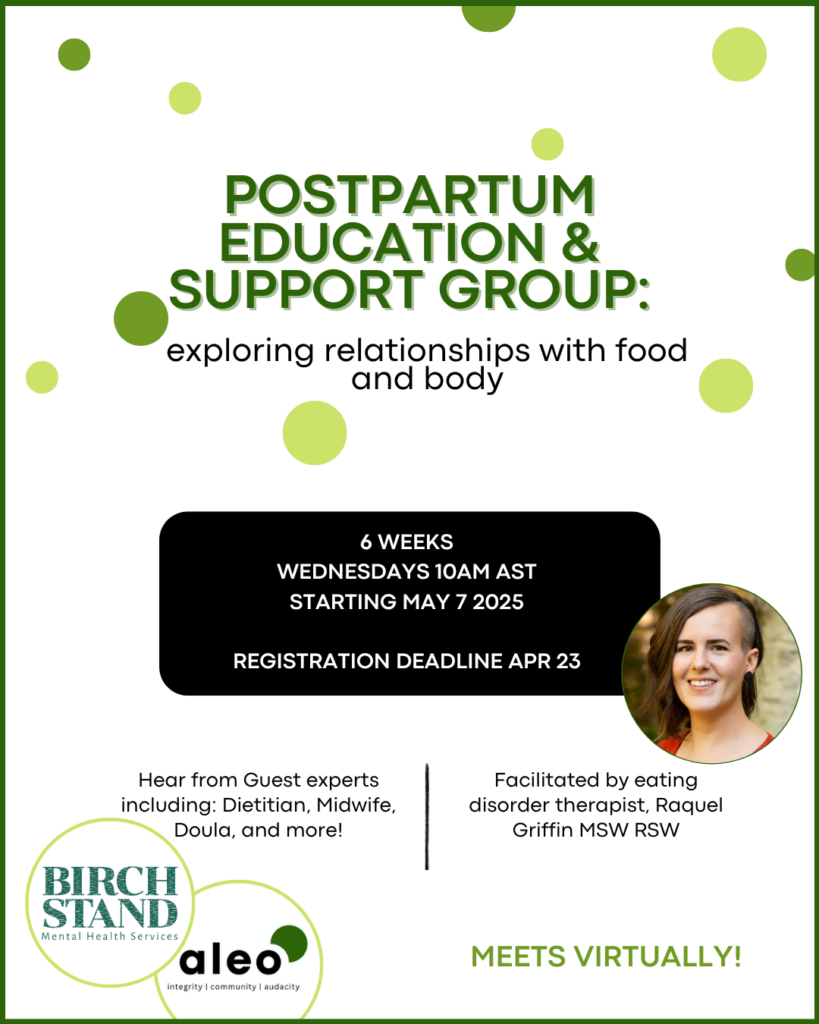
Join our virtual 6-week Postpartum Education and Support group and expect to:
Learn more on how to explore a more peaceful relationship with food and body from a variety of experts in the disordered eating and reproductive health fields
Receive and extend emotional support to others experiencing similar struggles with food, eating, body, and parenthood
Program Summary
What: a 6-week professionally facilitated group
Where: meeting virtually on Zoom
For: individuals 19+ living in NS, NB, or ON
When: beginning May 7th, 6 consecutive Wednesdays 10:00am-11:30am Atlantic Time
Registration deadline: April 23rd
Cost: 90$ per week or 80$ per week for Early Bird rate (must register on or before April 16th). May be covered by private insurance.
All participants must agree to the Group Participation Agreement
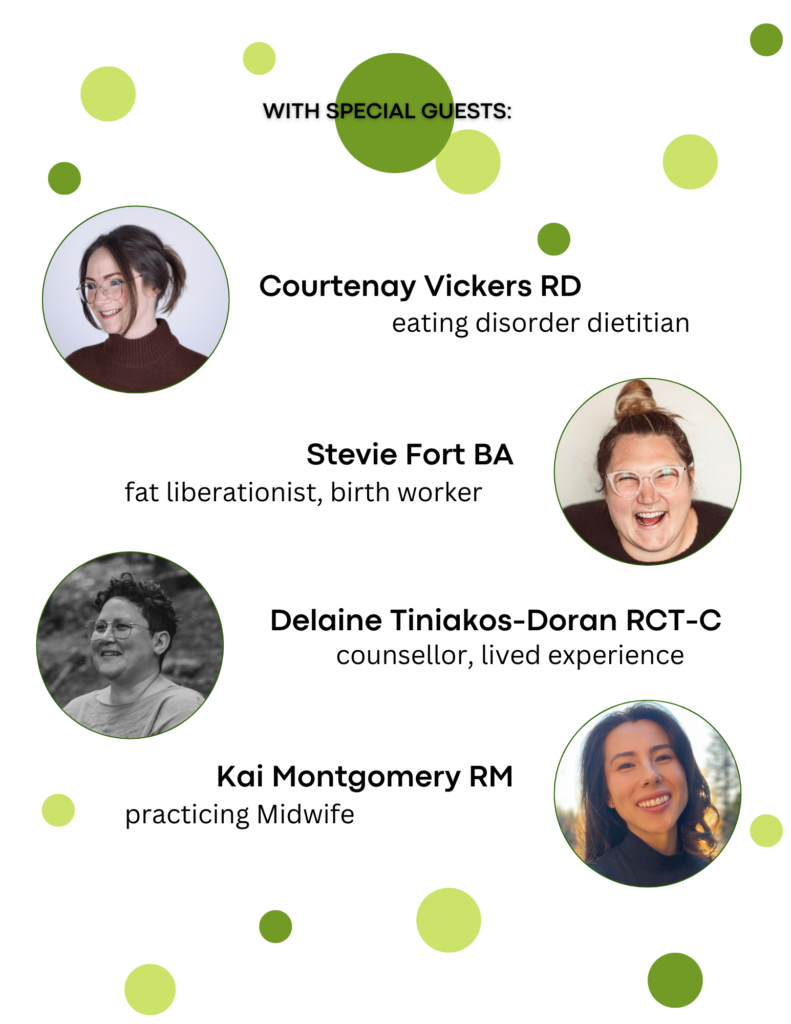
About the Facilitator: Raquel Griffin MSW RSW
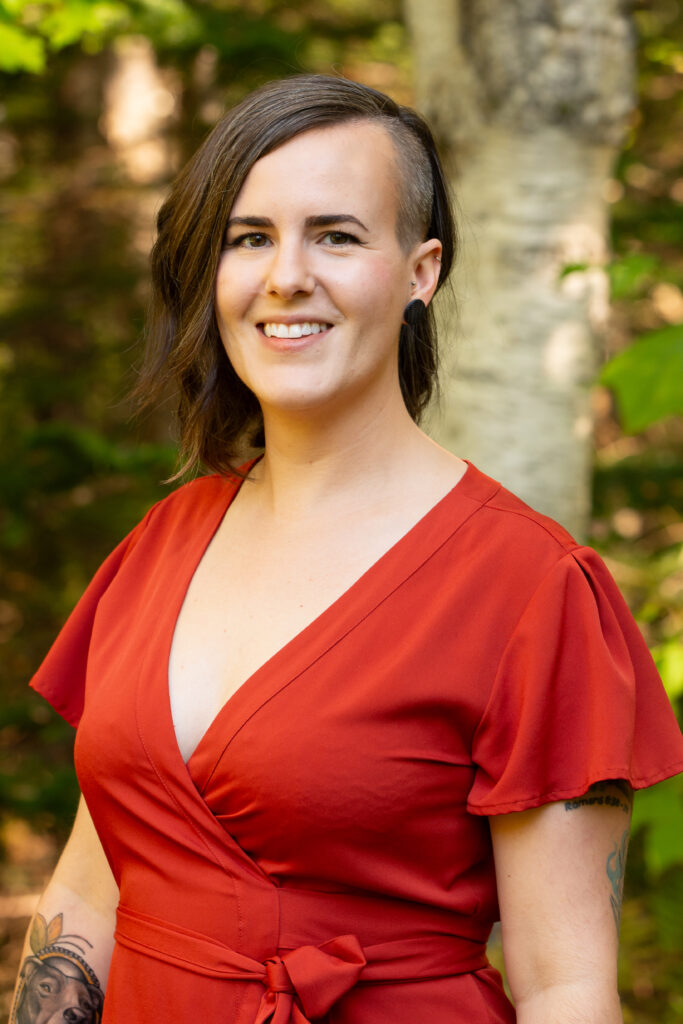
Raquel (she/her) is a private practice therapist based in Kjipuktuk (Halifax, Nova Scotia) and co-founding member of The Aleo Collective, a professional collective of eating disorder practitioners. She is a Registered Social Worker, Certified Intuitive Eating Counsellor, and specializes in eating disorders and anxiety. Raquel’s professional work is also deeply informed by her lived experiences, including recovering from an eating disorder. After giving birth to her child in 2021, Raquel became intimately familiar with the food, eating, and body image concerns many birthing folks experience. This group has been a passion project of hers– to support those with unique experiences and intersections of food/body relationships and mental health all while trying to hang on throughout the rollercoaster ride of parenthood.
About the Guest Speakers:
Courtenay Vickers (she/her) is a Registered Dietitian specializing in eating disorder care, based in Hamilton, Ontario, Canada. With over a decade of experience as an RD, Courtenay is passionate about providing weight-inclusive eating disorder care. She approaches her work through an anti-diet lens, challenging diet culture norms and looking beyond traditional ED care to help individuals heal their relationship with food and body.
Courtenay has run her own private practice for over six years, focusing on eating disorders. She has collaborated with numerous providers and organizations, offering individual nutrition counselling, group facilitation, professional training and supervision, and more within the ED field.
When she’s not supporting clients in their recovery, Courtenay can often be found exploring nature with her dog, baking something in the kitchen, or reading a good book.

Courtenay (she/her)
Stevie Fort (she/her) is a fat liberationist, prison abolitionist, and birth worker. Her journey to birth work started as a volunteer birth doula and has brought her to full-time work as a childbirth educator, lactation educator, and champion of reproductive justice. Stevie is fat and this informs her perspective as a birth worker and educator.
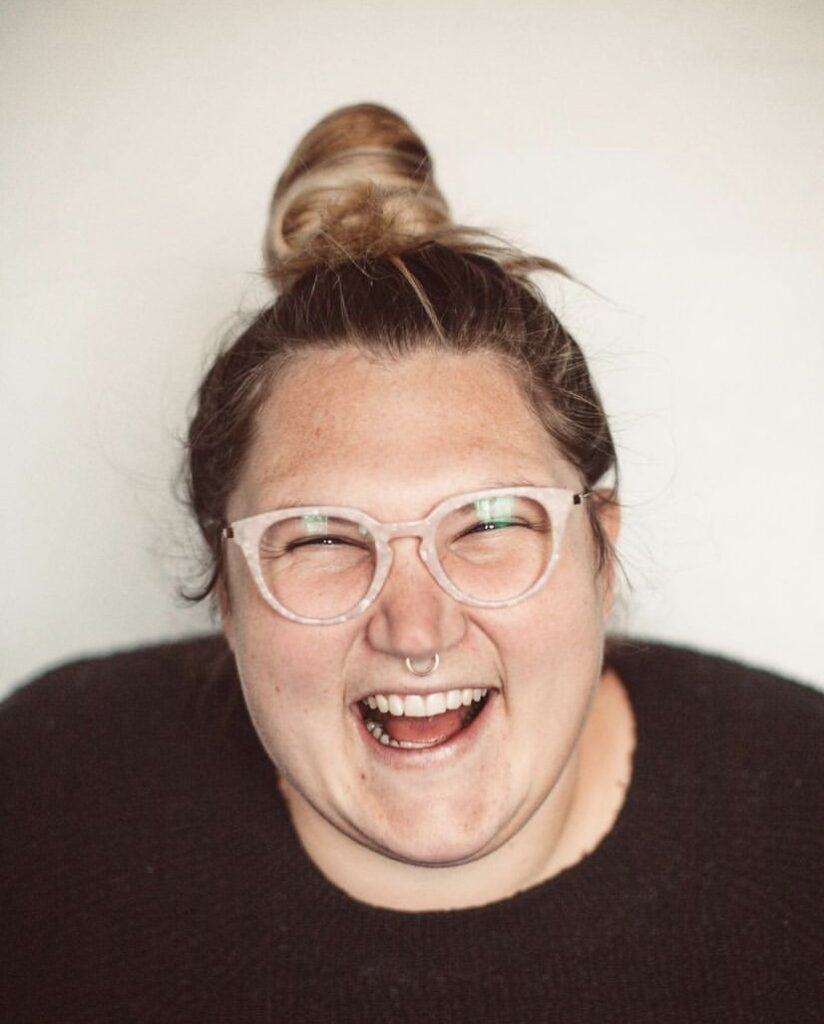
Stevie (she/her)
Delaine Tiniakos-Doran (they/she) is a white settler in Kjipuktuk currently wrapping up their Master’s in Counselling Therapy from Acadia University (June 2025). They weave their lived experience of being nonbinary and neurodivergent into their work to make an affirming space for clients. In her therapeutic work Delaine centers the agency and dignity of clients through a trauma-informed, fat-positive, and anti-oppression lens.
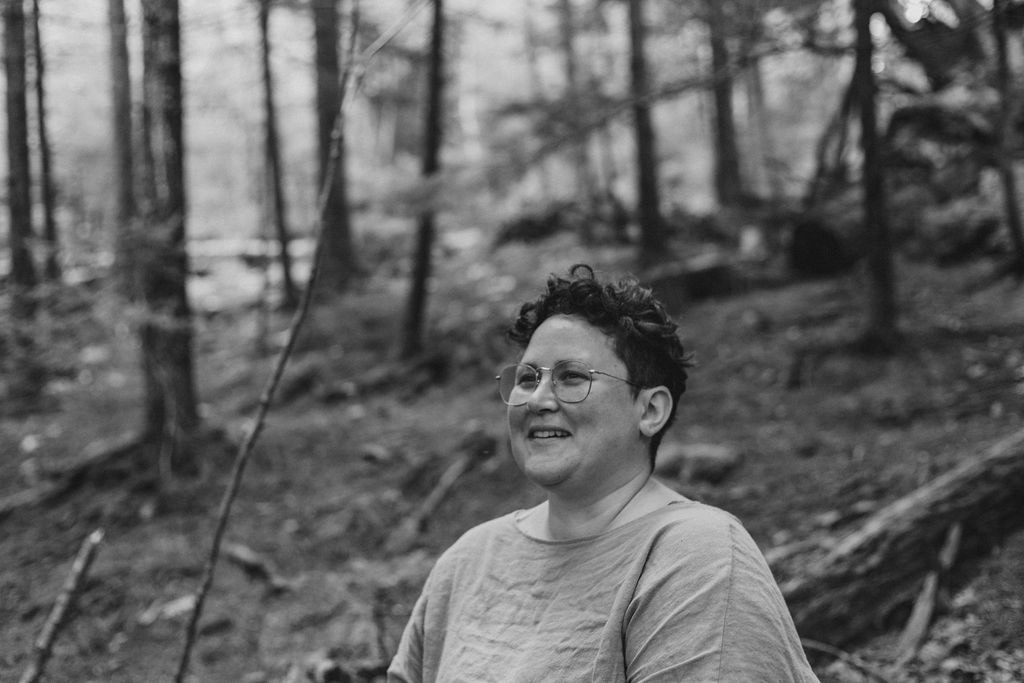
Delaine (they/she)
Kai Montgomery (she/her) holds a Bachelor of Health Sciences in Midwifery from McMaster University and is currently registered as a practicing (non-clinical) midwife in Nova Scotia. With a strong foundation in reproductive health and a deep understanding of the postpartum period, she is passionate about supporting individuals navigating the complex intersections of parenthood, body image, and disordered eating. Informed by both professional training and lived experience with an eating disorder, Kai is committed to fostering compassionate, trauma-informed spaces for healing and connection. She continues to advocate for more inclusive, patient-centered care that acknowledges the unique challenges of the perinatal period.
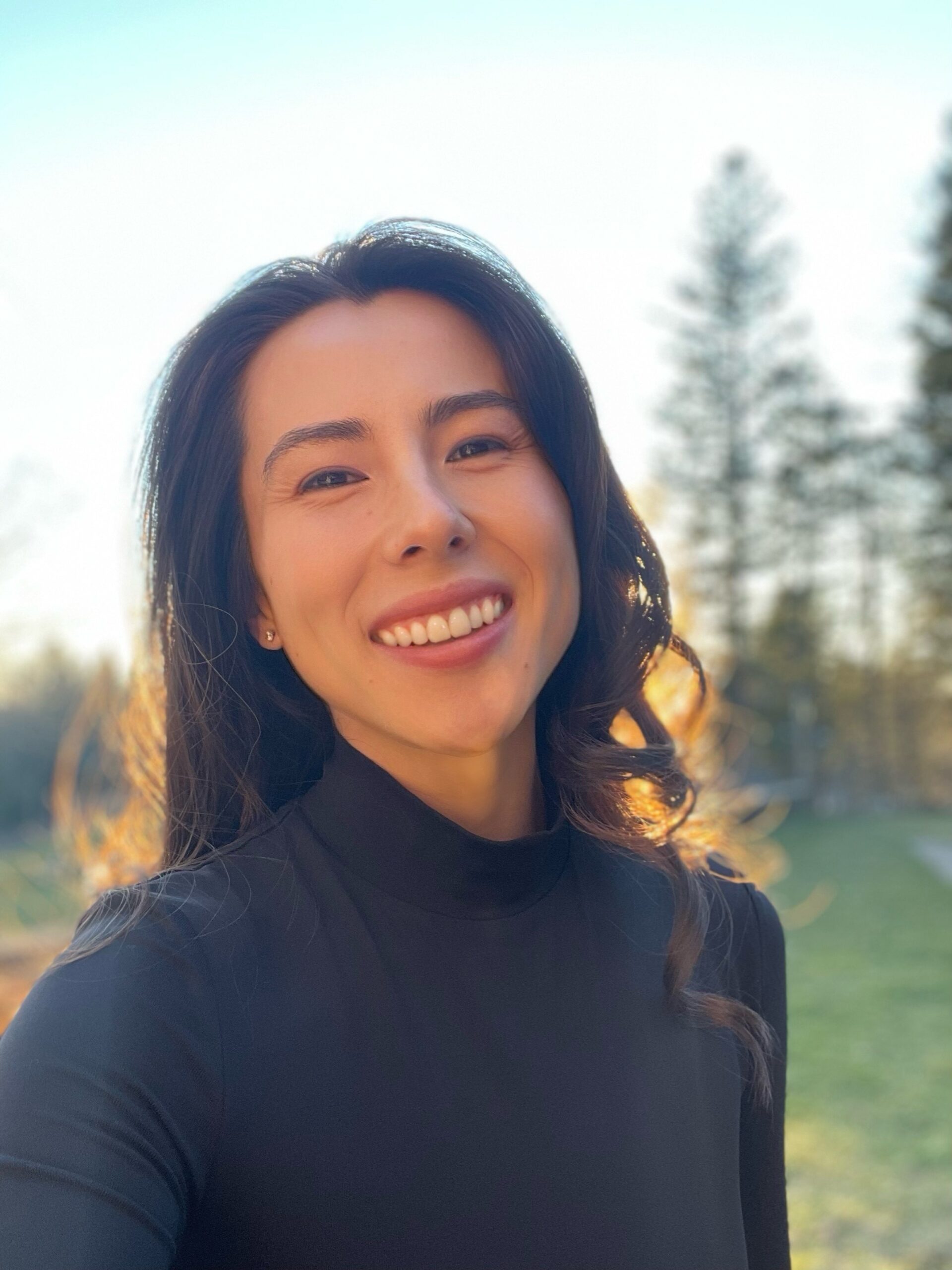
Kai (she/her)
FAQ
I haven’t given birth yet. Can I still register?
Yes! Keep in mind that the focus of the group will be exploring postpartum food/eating/body challenges. But, the information and support could be helpful for those later in their pregnancy who are worried about or anticipating these challenges after giving birth.
What are you defining as the “postpartum” period?
There is no specific timeframe we’re defining. The group is for those struggling with your relationship to your body, food, or eating since giving birth. Whether you gave birth last month, last year, or 5 years ago, we’re happy to have you!
What can I expect week to week from the group?
The group sessions are 90 minutes long with a 5 minute break in the middle.
The first half of the session will be education focused featuring a guest speaker and expert. This could include a mini-presentation, sharing a story, or inviting the group to participate in an activity. Question and Answer time will be reserved to make time for any burning questions you may have for the guest speakers.
The second half will function as an open and unstructured support group session, facilitated by Raquel Griffin. This means there won’t be specific content, material, framework or structure. Raquel may offer different prompts, questions, or topic themes to begin a group discussion about the struggles participants are facing and how they cope.
How many people will be in the group?
We expect somewhere between 6 and 12 group participants. This group will be closed, meaning it will be the same group of people attending each week.
I don’t identify as a cis woman or a mother, but I’m interested in the topics and have given birth. Is this group for me?
Yes! Trans and non-binary birthers are welcome here. Keep in mind that participants may use the specific words and terms that feel right for them when talking about their specific body, identity as a parent, or relationship orientation (e.g. “I’m breastfeeding…”, “as a mom…”, “my husband…”). The facilitator and guest speakers will include neutral language regarding gender, sexual orientation, and relationship orientation (e.g. “chest-feeding”, “partner”, “pregnant or birthing people”).
How do I register?
Click here to email Raquel to learn more about how to secure your spot in the group.
Is there a sliding scale rate?
Unfortunately, no. We tried to find a price point that was more affordable for folks while still being able to compensate the facilitator and guest speakers for their time. However, if you register on or before April 16th, you can pay the Early Bird rate, saving a total of 60$.
Will my private insurance cover this service?
Possibly. If you have private insurance for mental health services, the group may be covered by your insurance provider (every provider, plan, and coverage differs from person to person). Contact your insurance provider to learn your full coverage details.
Do you direct bill to insurance?
Yes, but it depends on the provider and it depends on what kind of service. Contact Raquel to learn more and talk through your specific situation.
If I can’t make a session, will I still have to pay?
Yes. Payment is required for all 6 sessions, regardless of attendance.
If I can’t make a session, will the session be recorded for me to watch afterward?
We understand that having and caring for a newborn can be an unpredictable time where you can often be at the whim of your baby’s schedule. For this reason, educational portions of the group (e.g. guest speaker components) will be recorded and distributed for viewing for those who are unable to make the live group. Recording links will expire after 3 days. Support group portions of the session will NOT be recorded, in efforts to respect the privacy and confidentiality of participants’. If all participants are in attendance, the session will not be recorded.
